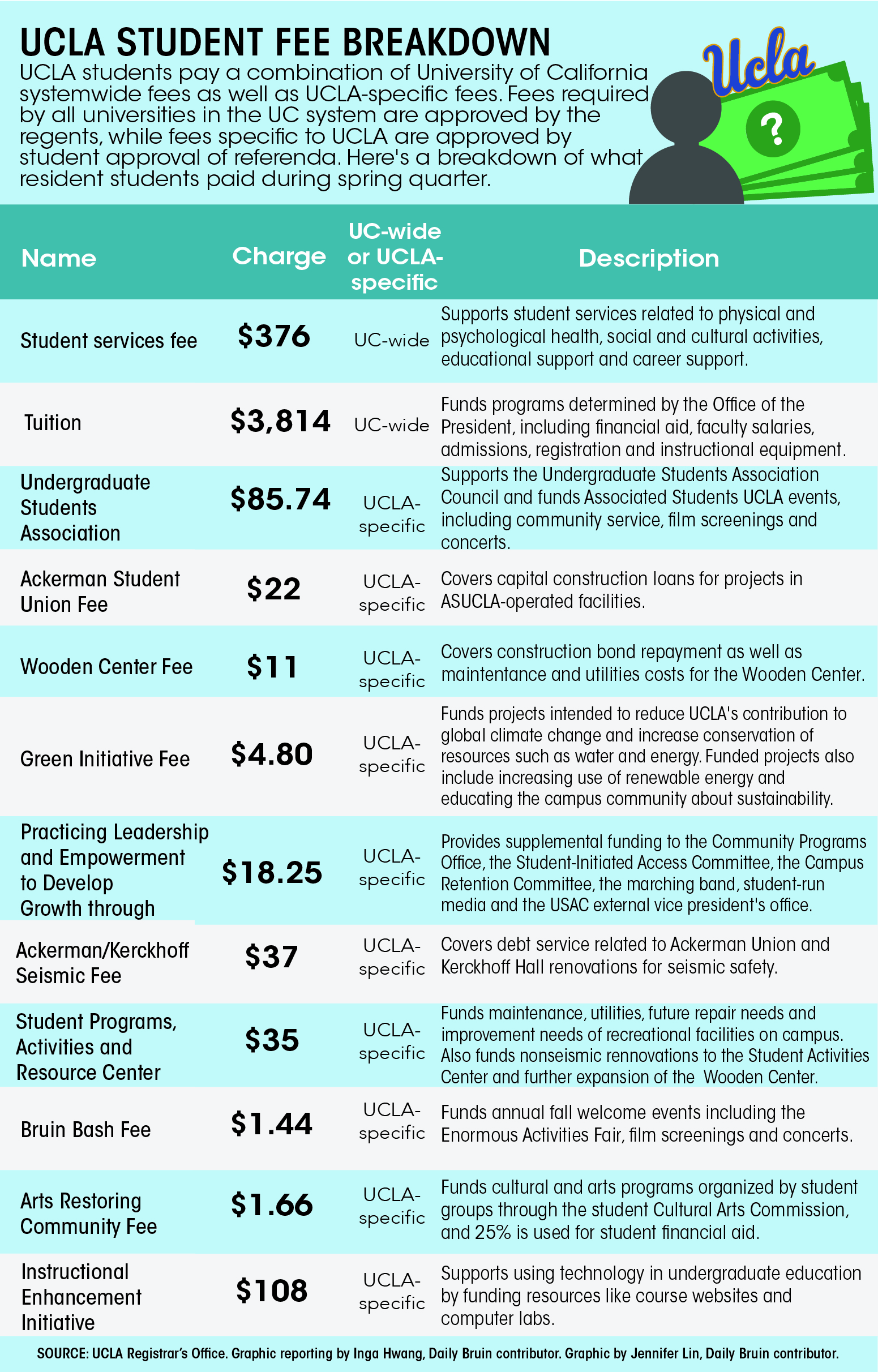Students say they are left in the dark about how university allocates their fees

By Inga Hwang
May 21, 2019 1:17 a.m.
Students said they are often unaware how the university spends their student fees.
Students pay two types of fees: UCLA-specific referendum fees, which are proposed by students and voted on during spring elections, and University of California systemwide fees, which are set by the UC Board of Regents.
Ten out of 11 student fee charges listed on the undergraduate BruinBill, which include all additional charges on top of tuition, are referendum fees paid only by students at UCLA.
Robert Watson, president of the Undergraduate Students Association Council, said he thinks referendum fees allow students to give the administration input about how their money is spent.
“Students are the most aware of what resources are lacking on campus,” Watson said. “Because of that, they should have the ability to propose referendum (fees) to the council.”
Some students said they are unaware they have the ability to vote on student fees, or that they find the voting process confusing.
Matthew Ko, a second-year computer science student, said he knows students have the option to vote on some student fees, but does not know how the voting process works.
Alexis Pinal, a fourth-year English student, said she did not know some student fees were approved by student votes.
All UC students are required to pay a Student Services Fee in addition to tuition. The Student Services Fee is set by the UC Board of Regents and funds services including social and cultural activities, physical and psychological health care services, and financial support for students.
Half of UCLA’s Student Services Fee funds mental health services while Chancellor Gene Block allocates the other half to campus departments and organizations, in part based on a recommendation from the Student Fees Advisory Committee.
The majority of allocated student fees go toward paying for nonstudent wages, said Zak Fisher, a law student and graduate student representative on SFAC. Fisher added administrative positions funded by nonstudent fee sources request Student Services Fee funding to cover 20-30% of their expenses.
Fisher said he thinks SFAC meetings should be more accessible to students so they can be better informed.
He added though SFAC meetings are open to the public in Murphy Hall 2325, he said he thinks the size of the room and lack of publicity discourage public attendance.
“If you had it in a room with a capacity that was greater than 20, when it’s a 12-person committee, maybe it would feel like a public meeting,” Fisher said.
Even within SFAC, some students say they feel administrators are overrepresented in the decision-making process.
Javier Rodriguez, a graduate student in social welfare and a graduate student representative on SFAC, said he felt student representatives’ views do not actually impact decisions regarding student fees.
“It didn’t seem right to me,” Rodriguez said. “There is like a hidden agenda happening here.”
Calvin Howes, a doctoral candidate in atmospheric and oceanic sciences, said he thinks it is difficult for students to find out online where student fees go.
“On the BruinBill, they’re listed with a name and to learn anything about their reasoning I had to follow a few links after that,” Howes said. “So it wasn’t exactly easy to learn what they were even when I wanted to.”
Rodriguez said he thinks the administration does not want students to know where their money is going.
“I think if (students) do know, then we’re going to be able to dictate where money should be going and where it should not be going,” Rodriguez said. “I think a lot of it is about control.”
UCLA spokesperson Ricardo Vazquez declined to answer questions about how students can become better informed about what student fees pay for.
Fisher said he thinks the administration should be more forthcoming about how student fee revenues are spent.
“Chancellor Block’s website has the Bruin values: respect, accountability, integrity, service and excellence,” Fisher said. “So I say all those values point towards transparency, radical transparency in my mind, at least compared to what we have right now.”
Contributing reports from Martín Bilbao, Daily Bruin contributor.


